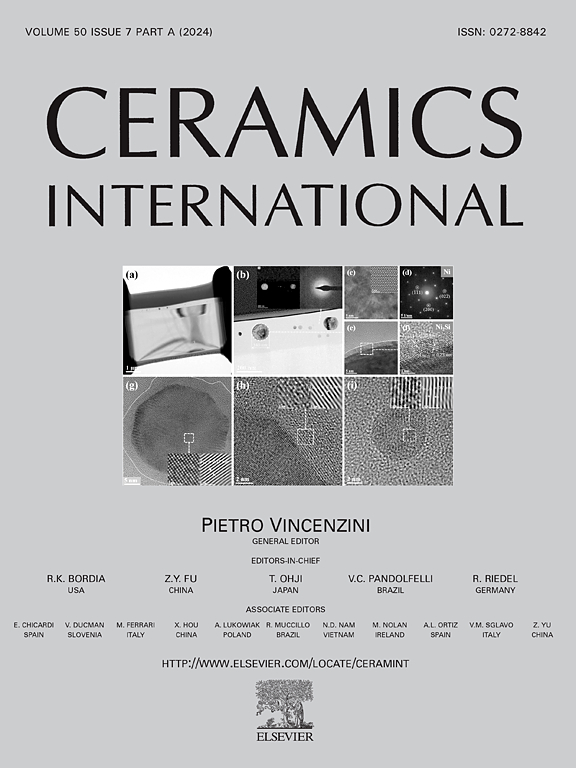用于生物医学应用的 TiO2、Ta2O5 和 Nb2O5 涂层 Ti6Al4V 钛合金比较研究
IF 5.1
2区 材料科学
Q1 MATERIALS SCIENCE, CERAMICS
引用次数: 0
摘要
用于医疗应用的难熔金属氧化物,如二氧化钛(TiO2)、氧化钽(Ta2O5)和氧化铌(Nb2O5)涂层钛及其合金,因其具有高硬度、强化学惰性和优异的生物相容性等显著特性,最近受到了广泛关注。然而,它们之间的比较研究仍然很少。本研究采用射频溅射技术在 Ti6Al4V 钛合金上沉积了 Ta2O5、Nb2O5 和 TiO2 薄膜。通过一系列测试,包括划痕、纳米压痕、摩擦磨损、电位极化和细胞培养实验,对它们的性能进行了比较评估。结果表明,这三种厚度约为 2.6-2.8 μm 的涂层都呈现出非晶柱状生长模式,表面致密,类似花椰菜。TiO2 涂层的结合力超过 50 N,分别是 Ta2O5 和 Nb2O5 的 26.2 倍和 14.5 倍。此外,与裸 Ti6Al4V 相比,所有涂层样品都具有优异的耐磨性、耐腐蚀性和生物相容性。在涂层中,TiO2 的性能最好,其次是 Ta2O5,而 Nb2O5 的性能最差。这些发现揭示了三种陶瓷涂层在 Ti6Al4V 样品上的性能差异,为进一步研究和选择涂层以提高 Ti6Al4V 钛合金的生物医学应用性能提供了宝贵的见解。本文章由计算机程序翻译,如有差异,请以英文原文为准。
A comparative study of TiO2, Ta2O5 and Nb2O5 coated Ti6Al4V titanium alloy for biomedical applications
Refractory metal oxides such as titanium dioxide (TiO2), tantalum oxide (Ta2O5), and niobium oxide (Nb2O5) coated-titanium and its alloys for medical applications have recently gained significant attention due to their remarkable properties, including high hardness, strong chemical inertness, and excellent biocompatibility. However, comparative studies among them remain scarce. In this study, thin films of Ta2O5, Nb2O5, and TiO2 were deposited on Ti6Al4V titanium alloy using radio frequency sputtering technology. Their properties were comparably evaluated through a series of tests, including scratching, nanoindentation, friction and wear, potentiodynamic polarization, and cell cultivation experiments. The results revealed that all three coatings, with a thickness of approximately 2.6–2.8 μm, exhibited an amorphous columnar growth pattern with dense surfaces resembling cauliflower. The bonding force of the TiO2 coating exceeds 50 N, which is 26.2 times and 14.5 times greater than that of Ta2O5 and Nb2O5, respectively. Furthermore, all coated samples demonstrate superior wear resistance, corrosion resistance, and biocompatibility compared to bare Ti6Al4V. Among the coatings, TiO2 showed the best performance, followed by Ta2O5, while Nb2O5 exhibited the least favorable performance. These findings revealed the performance differences among the three ceramic coatings on Ti6Al4V samples and offer valuable insights for further research and the selection of coatings to enhance the properties of Ti6Al4V titanium alloy for biomedical applications.
求助全文
通过发布文献求助,成功后即可免费获取论文全文。
去求助
来源期刊

Ceramics International
工程技术-材料科学:硅酸盐
CiteScore
9.40
自引率
15.40%
发文量
4558
审稿时长
25 days
期刊介绍:
Ceramics International covers the science of advanced ceramic materials. The journal encourages contributions that demonstrate how an understanding of the basic chemical and physical phenomena may direct materials design and stimulate ideas for new or improved processing techniques, in order to obtain materials with desired structural features and properties.
Ceramics International covers oxide and non-oxide ceramics, functional glasses, glass ceramics, amorphous inorganic non-metallic materials (and their combinations with metal and organic materials), in the form of particulates, dense or porous bodies, thin/thick films and laminated, graded and composite structures. Process related topics such as ceramic-ceramic joints or joining ceramics with dissimilar materials, as well as surface finishing and conditioning are also covered. Besides traditional processing techniques, manufacturing routes of interest include innovative procedures benefiting from externally applied stresses, electromagnetic fields and energetic beams, as well as top-down and self-assembly nanotechnology approaches. In addition, the journal welcomes submissions on bio-inspired and bio-enabled materials designs, experimentally validated multi scale modelling and simulation for materials design, and the use of the most advanced chemical and physical characterization techniques of structure, properties and behaviour.
Technologically relevant low-dimensional systems are a particular focus of Ceramics International. These include 0, 1 and 2-D nanomaterials (also covering CNTs, graphene and related materials, and diamond-like carbons), their nanocomposites, as well as nano-hybrids and hierarchical multifunctional nanostructures that might integrate molecular, biological and electronic components.
 求助内容:
求助内容: 应助结果提醒方式:
应助结果提醒方式:


